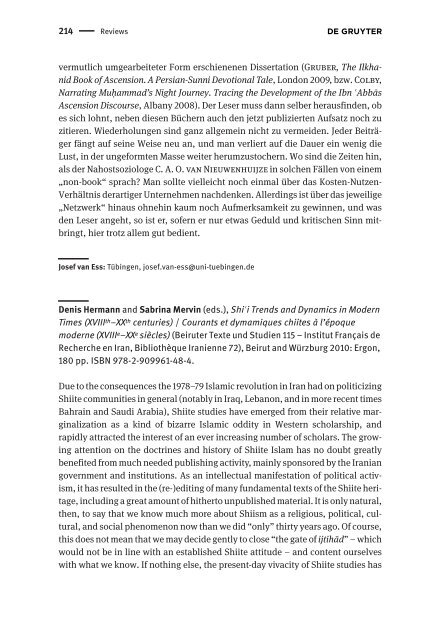0021-1818_islam_98-1-2-i-259
0021-1818_islam_98-1-2-i-259
0021-1818_islam_98-1-2-i-259
Create successful ePaper yourself
Turn your PDF publications into a flip-book with our unique Google optimized e-Paper software.
214 Reviews<br />
vermutlich umgearbeiteter Form erschienenen Dissertation (Gruber, The Ilkhanid<br />
Book of Ascension. A Persian-Sunni Devotional Tale, London 2009, bzw. Colby,<br />
Narrating Muhammad’s Night Journey. Tracing the Development of the Ibn ^Abbas<br />
Ascension Discourse, Albany 2008). Der Leser muss dann selber herausfinden, ob<br />
es sich lohnt, neben diesen Büchern auch den jetzt publizierten Aufsatz noch zu<br />
zitieren. Wiederholungen sind ganz allgemein nicht zu vermeiden. Jeder Beiträger<br />
fängt auf seine Weise neu an, und man verliert auf die Dauer ein wenig die<br />
Lust, in der ungeformten Masse weiter herumzustochern. Wo sind die Zeiten hin,<br />
als der Nahostsoziologe C. A. O. van Nieuwenhuijze in solchen Fällen von einem<br />
„non-book“ sprach? Man sollte vielleicht noch einmal über das Kosten-Nutzen-<br />
Verhältnis derartiger Unternehmen nachdenken. Allerdings ist über das jeweilige<br />
„Netzwerk“ hinaus ohnehin kaum noch Aufmerksamkeit zu gewinnen, und was<br />
den Leser angeht, so ist er, sofern er nur etwas Geduld und kritischen Sinn mitbringt,<br />
hier trotz allem gut bedient.<br />
Josef van Ess: Tübingen, josef.van-ess@uni-tuebingen.de<br />
Denis Hermann and Sabrina Mervin (eds.), Shi^i Trends and Dynamics in Modern<br />
Times (XVIII th–XX th centuries) / Courants et dymamiques chiites à l’époque<br />
moderne (XVIII e–XX e siècles) (Beiruter Texte und Studien 115 – Institut Français de<br />
Recherche en Iran, Bibliothèque Iranienne 72), Beirut and Würzburg 2010: Ergon,<br />
180 pp. ISBN 978-2-909961-48-4.<br />
Due to the consequences the 1978–79 Islamic revolution in Iran had on politicizing<br />
Shiite communities in general (notably in Iraq, Lebanon, and in more recent times<br />
Bahrain and Saudi Arabia), Shiite studies have emerged from their relative marginalization<br />
as a kind of bizarre Islamic oddity in Western scholarship, and<br />
rapidly attracted the interest of an ever increasing number of scholars. The growing<br />
attention on the doctrines and history of Shiite Islam has no doubt greatly<br />
benefited from much needed publishing activity, mainly sponsored by the Iranian<br />
government and institutions. As an intellectual manifestation of political activism,<br />
it has resulted in the (re-)editing of many fundamental texts of the Shiite heritage,<br />
including a great amount of hitherto unpublished material. It is only natural,<br />
then, to say that we know much more about Shiism as a religious, political, cultural,<br />
and social phenomenon now than we did “only” thirty years ago. Of course,<br />
this does not mean that we may decide gently to close “the gate of ijtihad” – which<br />
would not be in line with an established Shiite attitude – and content ourselves<br />
with what we know. If nothing else, the present-day vivacity of Shiite studies has


